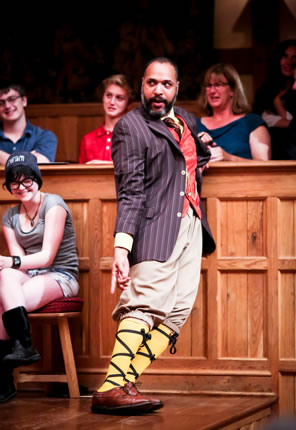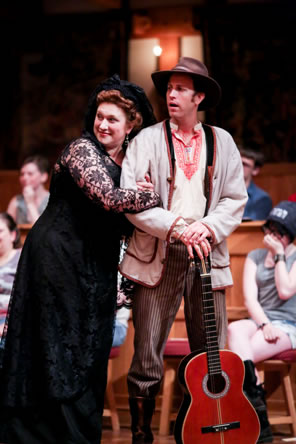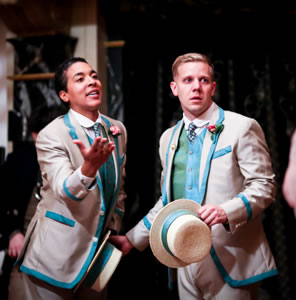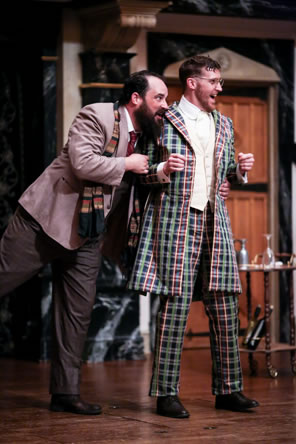Twelfth Night
Improbable Fiction Made Perfectly Probable
American Shakespeare Center, Blackfriars Playhouse, Staunton, Virginia
Saturday, June 18, 2016, C–10&11 (right stalls)
Directed by Beth Burns

Malvolio (René Thornton Jr.) shows off his yellow stockings and cross garters in the American Shakespeare Center's production of Shakespeare's Twelfth Night at the Blackfriars Playhouse. The girl sitting next to him plays a role in the box-tree scene. Photo by Lindsey Walters, American Shakespeare Center.
Of course Twelfth Night is "improbable fiction." Fabian tells us that in the play itself: "If this were played upon a stage now, I could condemn it as an improbable fiction," Olivia's servant says after he and his fellows have gulled the manor house's spoilsport steward, Malvolio. Is this William Shakespeare winking at his audience, knowing he's knee-deep or higher in ridiculousness?
But the thing is, not only was this improbable fiction being played upon a stage when Fabian said it the first time in 1601, Fabian has been saying the same line on stages for more than 400 years since. When Zack Powell playing Fabian says it in the American Shakespeare Center's current production on the Blackfriars Playhouse stage in Staunton, Virginia, the line gets a laugh and applause.
What may have been a wink in 1601 is now poignant irony. Twelfth Night is not just Shakespeare at the top of his comic powers, it is an almost perfectly crafted play, even with a plot that is more improbable now than then. Twins, Viola and Sebastian, are separated by ship wreck, both thinking the other is dead; she disguises herself as a boy and serves as Duke Orsino's love messenger to the Countess Olivia, who falls in love with Viola before Sebastian shows up to make it all even more confusing. Plus there's a pirate who follows Sebastian upon murky motivation, a superfluous-seeming Fool, and the subplot of Malvolio's gulling, which relies on "the spirit of humors" that causes him to read aloud while his antagonists hide loudly in a nearby box tree. For decades, if not centuries, directors have tried to make the play less improbable. The result is usually something not quite so well crafted, even if it might yet be entertaining.
However, productions that just let the play do its own thing not only reveal its perfections, the productions themselves become nothing short of perfect. Thus was the all-male version produced by Shakespeare's Globe in London in 2013. Helmed by Tim Carroll and starring Mark Rylance as Olivia, it became Broadway's biggest box office success the following winter of 2013–2014. It achieved Shakespearean perfection in part because, with a man playing Viola in Elizabethan costume, the twins looked identical.
The current production at the Blackfriars Playhouse, a re-creation of Shakespeare's own indoor theater, achieves perfection, too, but with a gender-integrated cast and no Elizabethan costuming to create a mirage of identical twins—heck, Viola (Jessika Williams) and Sebastian (Benjamin Reed) don't even have the same skin color. This presentation's success is a testament to the entire cast's acting skills and how each member embraces his or her character so completely that, even when they go wrong, they get it so right.
Director Beth Burns, founding Artistic Director of Hidden Room Theatre in Austin, Texas, gives the action an Oscar Wilde aesthete by dressing the players mostly in early 20th century English country manor costumes by Designer Tricia Emlet: brightly trimmed three-piece suits (Andrew Aguecheck in green and purple plaid), jodhpurs, straw boater hats, and the servants in black, Malvolio as a classic butler. Other than this visual, Burns not only stays out of the play's way, she unharnesses the talents of her cast and the quality of the Blackfriars play space.
As many in the cast are Blackfriars veterans and used to the staging conditions of the Playhouse—universal lighting, no sets, audience in close proximity on three sides and even sitting on "gallants' stools" on the stage itself—they work brilliantly with the play space. This brings huge payoffs in the box tree scene when Sir Toby Belch (David Anthony Lewis), Sir Andrew Aguecheek (Patrick Earl), and Fabian watch the letter that Maria (Shunté Lofton) has written in Olivia's hand and planted for Malvolio (René Thornton Jr.). Belch, Aguecheek, and Fabian end up hiding behind audience members on the gallants' stools, and Fabian even uses a patron as a shield. When he makes too much noise, Thornton's Malvolio looks behind him, sees a teen-age girl standing there, shrugs as if it's nothing unusual, and carries on reading the letter. It's a wonderful fourth-wall moment.
This Twelfth Night has many such fourth-wall moments, evidence that Shakespeare never intended the play to be anything more probable than a fiction played upon a stage. He wants the audience to use its imagination to help the plot along, so his instruction to his players (via the lines they speak) is to bring the audience into the action itself. This cast runs with those instructions. Lewis as Toby takes a cushion he needs as a prop out from under a woman sitting on a gallant stool, whereupon the man sitting next to her offers his cushion, earning audience applause. Shortly after, Toby tells Aguecheek, "Thou art a scholar," then Lewis turns to the gallant and says, "and thou art a gentleman," earning another applause (this production gets applause at least a dozen times, some at the end of scenes but many on lines, too, plus a standing ovation before the final song is completed—standing O's are common these days, but how quickly it comes is the unique thing).
Don't think that the players are looking for cheap laughs or relying on improvisational riffing to get through the play. I adore Twelfth Night, for its characters, its verse, its humor, and its psychological and emotional depth; yet I have never been as mesmerized by the play and its poetry as I was seeing this presentation of it. By the time you get to the first interview between Olivia and Cesario (Viola in disguise), you know you are in for a special, special night of Shakespeare. The breathtaking dive into the play's depths comes on such a simple line, too. After some initial banter, Viola reports that her message to Olivia (Allison Glenzer) lies in Orsino's bosom, "in the first of his heart." "O, I have read it. It is heresy," Olivia replies, Glenzer doing so with a quick and curt delivery. "Have you no more to say?" she continues dismissively. "Good madam, let me see your face," Viola suddenly says, and between these two actresses and the women they are playing, an ethereal spark ignites, charging the air with both tension and heightened expectation.
These two actresses drive us beyond that expectation over and over again. "Allie is astonishing as Olivia," I scribbled in my notes during the performance. Well, Glenzer is so often astonishing in her performances that you would think I don't need to write down a reminder. Context is key, though: I've seen Olivia, one of the canon's great characters, played more than two dozen times before—including by Rylance.
Olivia is a woman still mourning the death of her father and brother, being hounded by the count to marry him, and having to host her drunken uncle, Toby, and that idiot knight he brought with him to court her, too. She is distraught (wearing a black mourning veil) when she first appears, and who should she see but Feste (Chris Johnston), the fool she adores but who had run away from the house at a time she needed him most. Her mourning is compounded by renewed heartbreak turning to anger, and Glenzer exhibits this emotional turmoil by her stiffening posture, hardening expression, and the crack in her voice. "Go to, you're a dry fool; I'll no more of you: besides, you grow dishonest." Feste is able to soften her heart, and in their tender interaction we get a glimpse of the Olivia who will soon fall giddily in love with Cesario (who is really Viola) and eventually rush into marriage with him (but really Sebastian). I've never seen a dagger sheathed so sensually as Olivia does with Sebastian's upon their first meeting. When she later requests that "Cesario" marry her at that moment, Glenzer speaks some 10 lines of beautifully solemn poetry until she gets to the last sentence: "What do you say?" which Glenzer speaks with playful seduction as if she's suggesting a game of Twister with a guy she just met in a hotel bar.
The whole cast provides such singular portrayals, from Patrick Earl's Southern plantation-bred Aguecheek to John Harrell's blithe Orsino. They achieve greatness by not only speaking Shakespeare's verse so well, but also finding rich detail about their characters in those lines. Earl's Aguecheek and Lewis's Toby show off real dancing skills, including "make[ing] water but in a sink-a-pace" as if they were male dogs. Toby picks Andrew's pocket of the sixpence he then gives Feste, which is why Andrew's next line, offering Feste "a testril of me, too" cuts short (a dash in the text) as he can't find that testril. When Viola realizes in soliloquy that Olivia has fallen for her, Williams speaks the line, "I am the man," with a strutting, manly pride, before tempering her attitude only slightly with "If it be so, as 'tis, poor lady, she were better love a dream." In her tone, Williams's Viola is proud to be "a dream" as well as "the man." For the moment she's not concerned with the consequences of this development; she's simply marveling at the irony that she's in a phantom love triangle involving Orsino, whom she pines for, and Olivia.
Even a mistake turns into a gem. On this opening night performance, as Viola enters for the final scene, Williams left her hat backstage. Reed, seeing it and, because their hats are used in some stage business, thought it best to somehow get it to Williams, handed it to Lauren Ballard, who was about to go on as the Priest. Ballard's Priest enters carrying the hat, and as she describes the marriage of Olivia and Cesario with "All the ceremony of this compact sealed in my function," she hands the boater to Williams, amping Viola's bewilderment. That Sebastian enters wearing his own hat, well, we don't question that, for this is improbable fiction.


 From top, Olivia (Allison Glenzer) and Feste (Chris Johnston); Viola (Jessika Williams) and Sebastian (Benjamin Reed) with their hats; Sir Toby Belch (David Anthony Lewis) and Andrew Aguecheek (Patrick Earl). Photos by Lindsey Walters, American Shakespeare Center.
From top, Olivia (Allison Glenzer) and Feste (Chris Johnston); Viola (Jessika Williams) and Sebastian (Benjamin Reed) with their hats; Sir Toby Belch (David Anthony Lewis) and Andrew Aguecheek (Patrick Earl). Photos by Lindsey Walters, American Shakespeare Center.
While the rest of the cast find their bearings from deep within their lines, Johnston turns his character of Feste outside in. With the early 20th century costuming, Johnston makes Feste a hobo and affects the mannerisms of Woody Guthrie both in the portrayal of the jester and in his interpretation of his songs. If any portrayal might have come off as gimmicky, it would have been this, except that Guthrie is a perfect model for the keen, witty, truth-telling Feste, and Johnston gives such a sweetly honest and wise reading of the fool that he not only brings home the part's thematic significance but its humor, too. Plus, Johnston is a first-class balladeer himself, so he wears the music well.
One character that might seem wrong to some audiences is Alexander Sovronsky as Antonio. The sea captain (accused by Orsino of being a pirate) who saves Sebastian from the shipwreck is most often played as gay and crushing on Sebastian. Sovronsky, however, doesn't give the role any homosexual overtones. What he finds in the lines instead is a fiercely adventurous spirit, a Puss 'n' Boots with a trimmed beard. In Shakespeare's Illyria, he will risk imprisonment or worse to hang out with his new bro, Sebastian (whom Reed plays as a no-nonsense adventurer, himself). In today's America, Sovronsky's Antonio would recruit fellow 20-somethings to go extreme snowboarding with him tonight and shark diving in the morning. Many directors grapple with how to handle the way Shakespeare ignores Antonio after his "How have you made division of yourself?" passage in the climactic finale; a homosexual reading allows directors to dwell on Antonio's supposedly lonely state. In this production, Antonio isn't the lonely type, and Sebastian takes him to the back of the stage and introduces him to Viola. Simple. It's not in Shakespeare's script, but neither is leaving him sad and isolated—or portraying him as gay, for that matter.
Another character who causes many directors problems in the final scene is Malvolio and his exit line, "I'll be revenged on the whole pack of you." That line's timbre comes down to how truthfully the character is played throughout the play. I can't say enough about how smartly Thornton plays Malvolio, but I don't need to; considering the many fine performances in this production, the one that most enthralls the other actors themselves is Thornton's. In a gathering of some cast members after the show, they tick off Malvolio moments as if they were reciting scenes from Monty Python and the Holy Grail. How Glenzer's Olivia slightly touches Malvolio's hand, sending a shiver of astonishment through his otherwise stiff bearing. How he talks to the letter itself when he agrees to its terms: "I will be proud, I will read politic authors, I will baffle Sir Toby, I will wash off gross acquaintance, I will be point-device the very man… I will be strange, stout, in yellow stockings, and cross-gartered, even with the swiftness of putting on!" How he says, "I am happy" like a schoolboy and lets out a little squeal as he exits. How he goes from being a Jeeves in black to an Algernon in yellow and cross-gartered. How, when in prison, he bounces so that only his head sporadically appears through the trapdoor in the stage as he speaks his lines.
Oh, yeah, the prison scene is funny. It also shows Malvolio in a sympathetic light (and it is the most noticeably trimmed scene in this production, a big chunk of Feste's Sir Topaz bit being pared). Shakespeare had no qualms portraying comedy and tragedy in juxtaposition, but modern minds conditioned to genre labels have trouble bridging the spectrum. ASC's actors, who are so concentrated on text-centric presentation, bring out the multidimensional emotions of plays from line to line.
So finely tuned is Thornton to Malvolio's character that we spot not one but two white fibs. The first is when he tells Viola/Cesario that she "peevishly threw" the ring to Olivia, which is not true. Thus, in the carousing knights' scene when Malvolio tells Toby that Olivia "bade me tell you that, though she harbors you as her kinsman, she's nothing allied to your disorders." Did she actually tell Malvolio that? Thornton's manner suggests that Malvolio may be exaggerating, at least, the same way he turned Olivia's "peevish messenger" into an incident we know didn't happen.
With this foundation, Malvolio's "problematic" exit line isn't a problem at all. Thornton's Malvolio is pathetic in the final scene, his cross-gartering in disarray and his demeanor disheveled. He is completely baffled by what has happened to him but still manages to hold on to his dignity as best he can. It is that last trait that takes over when he learns the magnitude of the trick played on him, and straightening himself into his former countenance, he issues his revenge threat the same way he tells Toby that Olivia is "very willing to bid you farewell" and Maria that Olivia "shall know" of her enabling "this uncivil rule" of Toby and Aguecheek. In other words, it's a threat borne on his imagined expectations. We trust that Fabian will bring him to a peace, as instructed by Orsino, and Malvolio will join in the all-cast dance at the end—which Thornton does.
After all, this is an improbable fiction. But when it comes to matters of the heart, there is only improbable facts. Shakespeare knows that well, and this company knows him well, and that partnership creates a play that is, probably, about as perfect as you can get.
Eric Minton
August 3, 2016
Comment: e-mail [email protected]
Start a discussion in the Bardroom



 Find additional Shakespeareances
Find additional Shakespeareances